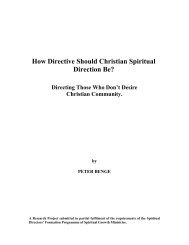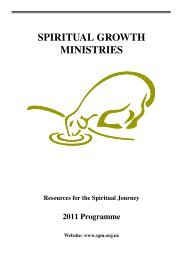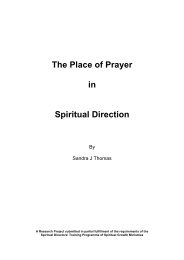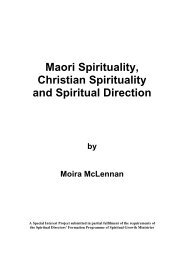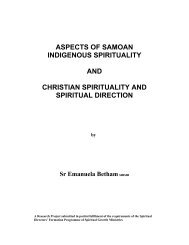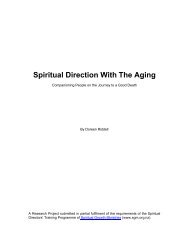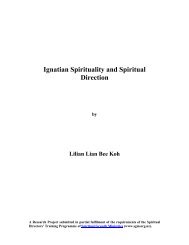Nourishing the soul in burnout - Spiritual Growth Ministries
Nourishing the soul in burnout - Spiritual Growth Ministries
Nourishing the soul in burnout - Spiritual Growth Ministries
You also want an ePaper? Increase the reach of your titles
YUMPU automatically turns print PDFs into web optimized ePapers that Google loves.
The negativism about self and o<strong>the</strong>rs and <strong>the</strong> decreased energy of <strong>burnout</strong> that lead to work<br />
and social disengagement impacts <strong>the</strong> person’s relationship with God. An impersonal way of<br />
th<strong>in</strong>k<strong>in</strong>g of oneself and o<strong>the</strong>rs dim<strong>in</strong>ishes ability to connect with a personal God; usual<br />
spiritual practices don’t br<strong>in</strong>g <strong>the</strong> usual sense of God’s presence. The person may be left with<br />
a sense of hav<strong>in</strong>g been abandoned by God. Physical tiredness and lack of concentration<br />
brought about by sleep difficulties fur<strong>the</strong>r dim<strong>in</strong>ishes <strong>the</strong> <strong>burnout</strong> sufferer’s energy to pursue<br />
spiritual activities. 8 There is often a spiritual crisis with accompany<strong>in</strong>g loss <strong>in</strong> and/or<br />
question<strong>in</strong>g of previously held core beliefs about God, self and <strong>the</strong> world 9 and <strong>the</strong> <strong>burnout</strong><br />
sufferer is easily led to “give up” on self and on God.<br />
I have observed that people <strong>in</strong> <strong>burnout</strong> often present as critical of <strong>the</strong> spiritual practices and<br />
enthusiasms of o<strong>the</strong>rs, and can be negative about <strong>the</strong>ir own church or Christian community.<br />
In spiritual direction sessions <strong>the</strong> person is more comfortable talk<strong>in</strong>g about work or family<br />
issues and f<strong>in</strong>ds it hard to even seek God <strong>in</strong> <strong>the</strong> experience or to see that <strong>the</strong> absence of God<br />
is significant. It is as if an absent God has become <strong>the</strong> norm and <strong>the</strong>re is no energy or po<strong>in</strong>t to<br />
hop<strong>in</strong>g to f<strong>in</strong>d <strong>the</strong> presence of God.<br />
Which o<strong>the</strong>r conditions of physical/emotional/spiritual stress are similar to <strong>burnout</strong>?<br />
One of my difficulties as I <strong>in</strong>vestigated <strong>the</strong> spiritual component of <strong>burnout</strong> was <strong>the</strong> similarity<br />
of symptoms with o<strong>the</strong>r conditions and <strong>the</strong> fact that often two or more conditions may appear<br />
concurrently. For example, stress may contribute to a reactive depression and a symptom of<br />
<strong>burnout</strong> is a flattened mood and <strong>in</strong>ability to engage with life which is a symptom of<br />
depression. The loss of a sense of God who is present <strong>in</strong> a dark night experience is also<br />
present <strong>in</strong> <strong>burnout</strong>. Accidie <strong>in</strong> its later stages carries an element of depressive illness and<br />
distance from God as does compassion fatigue. Each condition can appear with underly<strong>in</strong>g<br />
sleep disturbances and sense of fatigue with life and all have an underly<strong>in</strong>g sense of be<strong>in</strong>g<br />
abandoned by or distant from God.<br />
In spiritual direction <strong>the</strong> focus is not on diagnosis or treatment of <strong>the</strong> underly<strong>in</strong>g condition but<br />
on help<strong>in</strong>g <strong>the</strong> directee develop her/his relationship with God even while liv<strong>in</strong>g <strong>the</strong> condition.<br />
However, direction may <strong>in</strong>clude explor<strong>in</strong>g possible causes of <strong>the</strong> seem<strong>in</strong>g break <strong>in</strong><br />
relationship with God <strong>in</strong> order to help <strong>the</strong> directee to consider possible appropriate<br />
responses. 10 S<strong>in</strong> or lack of self care (<strong>in</strong>clud<strong>in</strong>g <strong>soul</strong> care), work<strong>in</strong>g conditions or personal life<br />
choices may all be present to some extent <strong>in</strong> all <strong>the</strong> follow<strong>in</strong>g conditions. Professional<br />
diagnosis and treatment may be one of <strong>the</strong> options and can be enhanced if undertaken<br />
concurrently with spiritual direction.<br />
7 O”Donnell, Kelly and Michele Lewis, article “Foxes Giants, and Wolves”, Published <strong>in</strong> International Journal of Frontier<br />
Missions, Vol 12:4 Oct-Dec(1995)<br />
8 Laidig, Joan & Speakman, Danielle “The Role of <strong>Spiritual</strong>ity <strong>in</strong> Understand<strong>in</strong>g and Cop<strong>in</strong>g with Traumatic Stress <strong>in</strong><br />
Humanitarian Aid Workers” Head<strong>in</strong>gton Institute (2010) 22<br />
9 ibid P37<br />
10 Picker<strong>in</strong>g, Sue. <strong>Spiritual</strong> Direction – a practical <strong>in</strong>troduction. Canterbury Press, Norwich (2008) 182<br />
2<br />
©<strong>Spiritual</strong> <strong>Growth</strong> M<strong>in</strong>istries 2012



